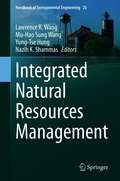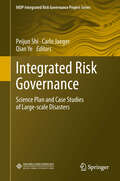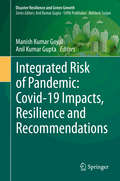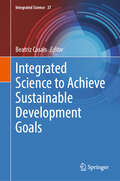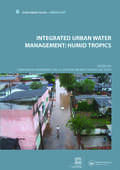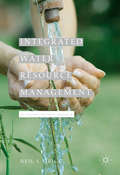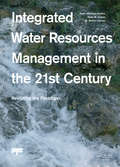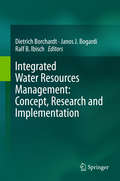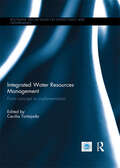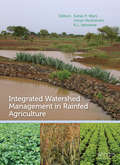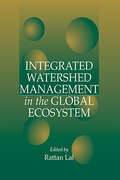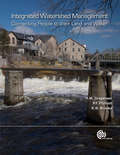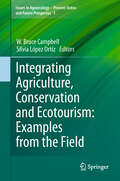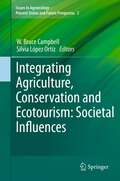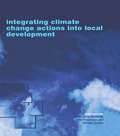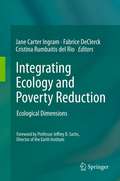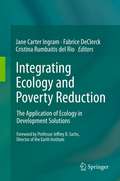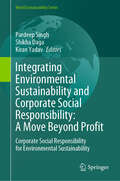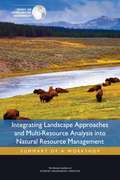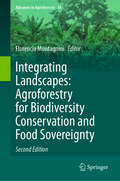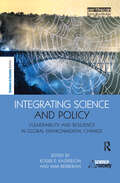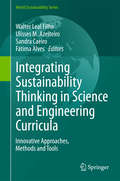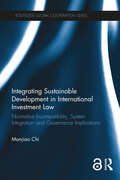- Table View
- List View
Integrated Natural Resources Management (Handbook of Environmental Engineering #20)
by Lawrence K. Wang Yung-Tse Hung Nazih K. Shammas Mu-Hao Sung WangThis edited book has been designed to serve as a natural resources engineering reference book as well as a supplemental textbook. This volume is part of the Handbook of Environmental Engineering series, an incredible collection of methodologies that study the effects of resources and wastes in their three basic forms: gas, solid, and liquid. It complements two other books in the series including "Natural Resources and Control Processes" and "Environmental and Natural Resources Engineering". Together they serve as a basis for advanced study or specialized investigation of the theory and analysis of various natural resources systems. The purpose of this book is to thoroughly prepare the reader for understanding the topics of global warming, climate change, glacier melting, salmon protection, village-driven latrines, engineers without borders (USA), surface water quality analysis, electrical and electronic wastes treatment, water quality control, tidal rivers and estuaries, geographic information systems, remote sensing applications, water losses investigations, wet infrastructure, lake restoration, acidic water control, biohydrogen production, mixed culture dark anaerobic fermentation, industrial waste recycle, agricultural waste recycle, recycled adsorbents, heavy metals removal, magnetic technology, recycled biohydrogen materials, lignocellulosic biomass, extremely halotolerant bacterial communities, salt pan and salt damaged soil. The chapters provide information on some of the most innovative and ground-breaking advances in resources conversation, protection, recycling, and reuse from a panel of esteemed experts.
Integrated Risk Governance
by Qian Ye Peijun Shi Carlo Jaeger"Integrated Risk Governance: Science Plan and Case Studies of Large-scale Disasters" is the first book in the IHDP-Integrated Risk Governance Project Series. It consists of two parts: Part I: Integrated Risk Governance Project Science Plan, which outlines the challenge, research programme, outcomes, and implementation strategy of the IRG Project; and Part II: Case Studies of Large-scale Disasters, which includes case analyses of experience, lessons learned and recommendations on various large-scale disasters around the world, such as the Tangshan and Wenchuan earthquakes and the great ice storm in China, European heat waves, and Hurricane Katrina in the USA. The community model of integrated natural disaster risk governance and paradigm of catastrophe risk governance in China are also presented. Prof. Peijun Shi works at Beijing Normal University, China; Prof. Carlo Jaeger works at Potsdam Institute for Climate Impact Research, Germany; Prof.Qian Ye works at Beijing Normal University, China.
Integrated Risk of Pandemic: Covid-19 Impacts, Resilience and Recommendations (Disaster Resilience and Green Growth)
by Anil Kumar Gupta Manish Kumar GoyalIn light of the novel corona virus outbreak in December 2019 and its subsequent impact on entire world as a global pandemic, the book attempts to provide integrated risk assessment on Covid -19 like pandemics, as well as to understand the societal, environment and economic impact of the outbreak in various sectors of development. It covers fundamental factors of global disease outbreaks and its coverage as major disaster through the complexity and severity of consequences, illustrating the dimensions of low frequency high intensity disasters. It brings together broad range of topics including basic concepts, isolation measure, role of governance and key technical advancements for containing the diseases. In addition, it also covers resilience analysis towards the impacts such outbreaks have on bio-diversity, ecosystem services and agricultural food production. It defines key exit strategies from the lessons learned and success stories of historical disease outbreaks. The book is presented in four parts, where part 1 familiarizes with fundamentals; part 2 focuses on integrated risk assessments; part 3 focuses on various measures and strategies of resilience; and part 4 suggests key lessons and recommendations. The book is a useful reading reference for scientific community, policy makers and professionals across the domains of health, environment, disasters and sustainable development. Book is specifically beneficial for postgraduate students, researchers, planners and field professionals.
Integrated Science to Achieve Sustainable Development Goals (Integrated Science #37)
by Beatriz CasaisThe book &‘Integrated Science to achieve Sustainable Development Goals&’ debates how different fields of study can confront or mitigate problems or contribute together to the development of society. In brief, it is a book about the interdisciplinarity of knowledge surrounding the topics in society that are involved in the world development agenda. There is an increasing recognition of the importance of achieving the sustainable development goals (SDGs) set in the UN agenda 2030. The book seeks to address the need for the integration of multidisciplinary fields of knowledge to achieve the seventeen SDGs. The book was developed with contributions from established and well-known scholars in different fields. It is interdisciplinary in nature and international in scope, intending to bring out a collection of state-of-the-art/cutting-edge knowledge on policies to achieve the 17 SDGs as well as a range of actionable recommendations for future developments in the different fields with the purpose of addressing the Agenda 2030. The integration of different disciplines (including sociology, health, education, psychology, business, economics, political science, environmental studies and urban planning) in a complex problem like societal development gives this book the challenge to be an authoritative tool with guidelines for the entire community and for policymakers as well. Each chapter presents the state of the art of a topic considered important to achieve SDGs. The authors explain how their field contributes to the achievement of one or more SDGs, including the main theories and examples of empirical evidence that may guide society in using such knowledge to contribute to societal impact.
Integrated Urban Water Management: UNESCO-IHP (Urban Water Series)
by Jonathan N Parkinson; Joel A. Goldenfum Carlos E.M.TucciExcess water in the urban environment results in flooding,which causes structural damage, risks to personal safety and disruption to city life. Water is also a major contributory factor for disease transmission as well as being the medium for transport of many pollutants. These problems are of increasing concern due to climate changes and are parti
Integrated Water Resource Management
by Neil S. GriggThis book addresses the enormous global challenge of providing balanced and sustainable solutions to urgent water problems. The author explores our dependence on access to safe water and other water-related services and how driving forces of the human and natural worlds are degrading this access. The greatest challenges involve conflicts between people and interest groups across all countries, as well as the economic and political difficulties in finding solutions through infrastructure development. The book takes an interdisciplinary approach to Integrated Water Resources Management or IWRM, which provides a set of tools for policy development, planning and organization, assessment, systems analysis, finance, and regulation. The author suggests that IWRM is challenging because of the human element, but that no other process can reconcile the conflicting agendas involved with water management. The broad range of topics covered here, as well as 25 case summaries, will be of interest to scientists, engineers, practitioners, and advanced level students interested in the integrated management of water as a resource.
Integrated Water Resources Management in the 21st Century: Revisiting the paradigm
by Maite M. Aldaya M. Ramón Llamas Pedro Martinez-SantosIntegrated water resources management (IWRM) advocates a coordinated approach for managing water resources in a way that balances social and economic needs with care for nature. While attractive, IWRM is both controversial and elusive. This book provides a down-to-earth approach to the elusive concept of integrated water resources management, drawing from conceptual frameworks and real-life practice to identify the key aspects that are yet to be resolved, it examines the role of water accounting, food trade, environmental externalities and intangible values as key aspects whose resolution will help the IWRM community move forward.
Integrated Water Resources Management: Concept, Research and Implementation
by Dietrich Borchardt Janos J. Bogardi Ralf B. IbischThis book reviews the concept, contemporary research efforts and the implementation of Integrated Water Resources Management (IWRM). The IWRM concept was established as an international guiding water management paradigm in the early 1990ies and has become a vital approach to solving the problems associated with the topic of water. The book summarizes fourteen comprehensive IWRM research projects with worldwide coverage and analyses their motivations, settings, approaches and implementation of results. Aiming to be an up-to-date interdisciplinary scientific reference, this book provides a comprehensive theoretical and empirical analysis of contemporary IWRM research, examples of science based implementations and a synthesis of the lessons learnt. It concludes with some major future challenges, the solving of which will further strengthen the IWRM concept.
Integrated Water Resources Management: From concept to implementation (Routledge Special Issues on Water Policy and Governance)
by Cecilia TortajadaThe book includes seventeen excellent researched and documented papers that reflect the diversity of thought, ideas and experiences related to IWRM. They draw from an extensive, inclusive and geographically representative range of theoretical propositions and practical examples. These include the implementation status of the IWRM concept at local, basin, regional and national levels; its appropriateness for the twenty-first century; main implementation gaps from the institutional, legal, policy, governance, management and technical viewpoints; the likelihood that IWRM’s entrenchment in laws, regulations and policies has led to smoother implementation and the reasons why that has been the case; reflexions on whether the attention given to IWRM is pushing other alternatives to the policy periphery; and the new conceptual constructions that can be put forward for discussion in the international arena.For the development and water communities it is imperative to debate and reach towards more illustrative conclusions regarding whether the promotion of the IWRM concept and its actual implementation status have been beneficial for development and how the notion could evolve to achieve this end. In-depth objective and constructive discussions, arguments, proposals and ideas are put forward for analysis by all interested parties. The book has the objective of fostering scholarly exchange, encouraging intellectual debate and promoting the advancement of knowledge and understanding of IWRM as a concept, as a goal per se and as a strategy towards development goals.This book was published as a special issue of the International Journal of Water Resources Development.
Integrated Watershed Management in Rainfed Agriculture
by Suhas P. Wani Johan Rockstrom Kanwar Lal SahrawatThis book provides a comprehensive presentation of the realization of improved rain fed agriculture yield in semi-arid and dry land areas. Besides techniques to improve the livelihood of small-scale farmers in developing countries, it includes examples and case studies for further support. The methods discussed have shown to be successful and economically remunerative in India and various African countries. Intended for professionals (investors, policy makers), researchers and (post)graduate students working on dry land and sustainable agriculture and water and natural resources management. Suited for courses in dry land agriculture, soil / water management and watershed development.
Integrated Watershed Management in the Global Ecosystem
by Rattan LalFocusing on the technical, social, and economic issues involved in watershed management, this interdisciplinary author team focuses on bettering land use practices and the condition of soil water resources.Integrated Watershed Management in the Global Ecosystem is a volume composed from an international symposium of the world's leading experts
Integrated Watershed Management: Connecting People to Their Land and Water
by Kenneth N. Brooks Hans M. Gregersen Peter F. FolliottGregersen, Folliott, and Brooks provide government agencies and other bodies with background information, factors to be considered, and procedures that facilitate organizing and guiding land and water use in concert with one another. The book can also serve as a reference for planning, monitoring, and implementing development efforts and natural resource management using the integrated watershed management approach. Annotation ©2008 Book News, Inc., Portland, OR (booknews.com)
Integrating Agriculture, Conservation and Ecotourism: Examples from the Field
by W. Bruce Campbell Silvia López OrtízIssues In Agroecology - Present Status and Future Prospectus not only reviews aspects of ecology, but the ecology of sustainable food production systems, and related societal and cultural values. To provide effective communication regarding status and advances in this field, this series connects with many disciplines such as sociology, anthropology, environmental sciences, ethics, agriculture, economics, ecology, rural development, sustainability, policy and education, and integrations of these general themes so as to provide integrated points of view that will help lead to a more sustainable construction of values than conventional economics alone. Such designs are inherently complex and dynamic, and go beyond the individual farm to include landscapes, communities, and biogeographic regions by emphasizing their unique agricultural and ecological values, and their biological, societal, and cultural components and processes.
Integrating Agriculture, Conservation and Ecotourism: Societal Influences
by W. Bruce Campbell Silvia López OrtízAgroecology not only encompasses aspects of ecology, but the ecology of sustainable food production systems, and related societal and cultural values. To provide effective communication regarding status and advances in this field, connections must be established with many disciplines such as sociology, anthropology, environmental sciences, ethics, agriculture, economics, ecology, rural development, sustainability, policy and education, or integrations of these general themes so as to provide integrated points of view that will help lead to a more sustainable construction of values than conventional economics alone. Such designs are inherently complex and dynamic, and go beyond the individual farm to include landscapes, communities, and biogeographic regions by emphasizing their unique agricultural and ecological values, and their biological, societal, and cultural components and processes.
Integrating Climate Change Actions into Local Development
by John Robinson Livia Bizikova Stewart CohenTo date, climate change adaptation and mitigation have been treated separately both in research and in the climate negotiations. However, a growing body of literature is now being developed that points to actual and potential synergies and trade-offs between responses to climate change and sustainability. This literature has evolved in a spontaneous way with diverse approaches and no common methodology to help practitioners explicitly plan for these synergies. This special issue of the Climate Policy journal addresses this gap between scientific knowledge and practitioners' needs by focussing on linkages between climate change and sustainable development at the level of conceptual framework and methods. In particular, the papers address in an integrated way local development options involving both adaptation and mitigation in order to promote resilience to climate change in human and natural systems. The special issue provides policy and methodological guidelines for linking local deveopment pathways with responses to climate change, based on collaboration between local practitioners, the public and scientists.
Integrating Ecology and Poverty Reduction: Ecological Dimensions
by Cristina Rumbaitis del Rio Fabrice Declerck Jane Carter IngramIn the past, the science of ecology has frequently been excluded from the development agenda for various reasons. Increasingly however there has been a renewed interest in finding more ecologically sustainable means of development that have required a strong foundation in ecological knowledge (for example EcoAgriculture Partnerships, EcoHealth presented at ESA, and EcoNutrition proposed by Deckelbaum et al). Each of these examples has already taken the critical first step at integrating ecological knowledge with agriculture, health and nutrition, respectively. However, this is only the first step; more attention needs to be placed not only on the role that two fields can play towards poverty alleviation, but on the role of a truly integrated, interdisciplinary approach towards development goals that is firmly grounded in ecological understanding. We feel that a critical look at what ecology can and cannot provide to the development agenda, in light of the Millennium Development goals, is timely and crucial. The introduction and the final section of the book will then integrate the lessons and principles outlined in each of the chapters. All chapter authors will be heavily encouraged to focus on how their sub-discipline in ecology impacts overall human well-being and environmental sustainability.
Integrating Ecology and Poverty Reduction: The Application of Ecology in Development Solutions
by Cristina Rumbaitis del Rio Fabrice Declerck Jane Carter IngramIn the past, the science of ecology has frequently been excluded from the development agenda for various reasons. Increasingly however there has been a renewed interest in finding more ecologically sustainable means of development that have required a strong foundation in ecological knowledge (for example EcoAgriculture Partnerships, EcoHealth presented at ESA, and EcoNutrition proposed by Deckelbaum et al). Each of these examples has already taken the critical first step at integrating ecological knowledge with agriculture, health and nutrition, respectively. However, this is only the first step; more attention needs to be placed not only on the role that two fields can play towards poverty alleviation, but on the role of a truly integrated, interdisciplinary approach towards development goals that is firmly grounded in ecological understanding. We feel that a critical look at what ecology can and cannot provide to the development agenda, in light of the Millennium Development goals, is timely and crucial. The introduction and the final section of the book will then integrate the lessons and principles outlined in each of the chapters. All chapter authors will be heavily encouraged to focus on how their sub-discipline in ecology impacts overall human well-being and environmental sustainability.
Integrating Environmental Sustainability and Corporate Social Responsibility: Corporate Social Responsibility for Environmental Sustainability (World Sustainability Series)
by Pardeep Singh Shikha Daga Kiran YadavThis book offers a comprehensive detail about the role that corporate social responsibility can play in promoting sustainable development thereby ensuring a resilient and greener future for all. The book emphasises how business strategies and environmental harmony are becoming more integrated, thereby supporting the agenda towards a sustainable development. The synergistic and symbiotic relationship between social responsibility and sustainability has evolved over the years with enterprises becoming more aware of their commitment towards ethical, equitable, inclusive, and environmentally conscious practices. Adopting a socially responsible attitude by the new age entrepreneurs represents the paradigm shift in how corporations understand and undertake their regular activities. The traditional objective of wealth maximisation that the enterprises followed led to severe misutilisation of resources in terms of its environmental and societal impact and led to severe corporate disasters. It gave rise to adopting alternative objectives that are not only holistic but also combine concern for profits, humanity, society, and, above all, the environment. The result is that almost every major corporation has adopted a code of conduct and established the necessary management structures and procedures to ensure compliance with the newly framed objective of socially responsible profits. Consequently, the concept of corporate social responsibility has acquired momentum in recent times. This has come after the realisation that social responsibility is a significant environmental and organisational sustainability dimension that only some enterprises can sustain for a while. Over the years, this harmonisation has ushered in significant progress, reshaping the perspective of businesses towards their societal and environmental impact.
Integrating Landscape Approaches and Multi-Resource Analysis into Natural Resource Management: Summary of a Workshop
by Engineering Medicine National Academies of SciencesThe responsible management of natural resources for present-day needs and future generations requires integrated approaches that are place-based, embrace systems thinking, and incorporate the social, economic, and environmental considerations of sustainability. Landscape-scale analysis takes this holistic view by focusing on the spatial scales most appropriate for the resource types and values being managed. Landscape-scale analysis involves assessing landscape features in relation to a group of influencing factors such as land use change, hydrologic changes or other disturbances, topography, and historical vegetation conditions. As such, different types of data and multiple disciplines may be required for landscape analysis, depending on the question of interest and scale of analysis. Multi-resource analysis (MRA) is an approach to landscape-scale analysis that integrates information among multiple natural resources, including ecosystem services, and is designed to evaluate impacts and tradeoffs between development and conservation at landscape scales to inform public resource managers. This approach implicitly addresses social, economic, and ecological functional relationships; for example, actions to realize the benefits of one type of natural resource (e.g., minerals, oil, and gas) may influence behavior and potential benefits related to other types of natural resources (e.g., recreational opportunities). In June 2015, the National Academies of Sciences, Engineering, and Medicine convened a workshop on using landscape-based approaches and MRA to better inform federal decision making for the sustainable management of natural resources. Participants discussed knowledge gaps and priority areas for research and presentations of case studies of approaches that have been used to effectively integrate landscape-based approaches and MRA into practice. This report summarizes the presentations and discussions from the workshop.
Integrating Landscapes: Agroforestry for Biodiversity Conservation and Food Sovereignty (Advances in Agroforestry #14)
by Florencia MontagniniThis updated and expanded second edition summarizes advances in agroforestry research and practice and proposes alternatives to increase the effectiveness of agroforestry systems. It offers an important contribution to help solve the most pressing development and environmental challenges in this sector today. The contributing authors present views from the academic, the practitioner and the development areas. Chapters offer alternatives and suggestions for facing challenges in agroforestry adoption, profitability, and in the implementation of integrated landscape management approaches.With new chapters and substantial revisions made in many others, the scope was broadened both geographically and thematically. Students, Scientists and practitioners will therefore gain more insights from Africa and Asia, as well as the Americas.
Integrating Science and Policy: Vulnerability and Resilience in Global Environmental Change (The\earthscan Science In Society Ser.)
by E. Kasperson Roger Berberian MimiAs progress towards a greater knowledge in sustainability science continues, the question of how better to integrate scientific progress with actual decisions made by practitioners remains paramount. This book aims to help close the gap between science and practice. Based on a two year collaborative project between Harvard and Clark Universities, the book takes as its focus the vulnerability and resilience of people around the world to the effects of environmental change, a mature area of research in which one might expect the gap between science and policy/practice to have been extensively bridged. The book presents analysis of past studies, interviews conducted with the producers and users of scientific knowledge, and case studies performed by leading scholars across a spectrum of international settings and political systems. Crucially, the authors identify new directions and tools for closing the gap between science and policy across a range of situations and societies. The result is an illuminating collection of studies and analyses that suggest to researchers, students, practitioners, and policy-makers alike how best to ensure that high quality environmental research informs good environmental policy and practice. ACKNOWLEDGEMENTS The editors and authors are grateful to Lu Ann Pacenka, who formatted the text of the book. The editors also wish to express their appreciation to Bill Clark and Nancy Dickson of Harvard University, who commissioned and provided oversight for the preparation of the volume. Both editors and authors wish to express their appreciation to the David and Lucile Packard Foundation for providing funds to support the project. Finally, the editors are grateful for the continuing support of the George Perkins Marsh Institute at Clark University. Published with Science in Society
Integrating Sustainability Thinking in Science and Engineering Curricula
by Walter Leal Filho Sandra Caeiro Ulisses M. Azeiteiro Fátima AlvesIncluding considerations of sustainability in universities' activities has long since become mainstream. However, there is still much to be done with regard to the full integration of sustainability thinking into science and engineering curricula. Among the problems that hinder progress in this field, the lack of sound information on how to actually implement it is prominent. Created in order to address this need, this book presents a wealth of information on innovative approaches, methods and tools that may be helpful in translating sustainability principles into practice.
Integrating Sustainable Development in International Investment Law: Normative Incompatibility, System Integration and Governance Implications (ISSN)
by Manjiao ChiThe current international investment law system is insufficiently compatible with sustainable development. To better address sustainable development concerns associated with transnational investment activities, international investment agreements should be made more compatible with sustainable development.Integrating Sustainable Development in International Investment Lawpresents an important systematic study of the issue of sustainable development in the international investment law system, using conceptual, normative and governance perspectives to explore the challenges and possible solutions for making international investment law more compatible with sustainable development. Chi suggests that to effectively address the sustainable development concerns associated with transnational investment activities, the international investment agreements system should be reformed. Such reform should feature redesigning the provisions of the agreements, improving the structure of international investment agreements, strengthening the function of soft law, engaging non-state actors and enhancing the dispute settlement mechanism.The book is primarily aimed at national and international treaty and policy-makers, lawyers and scholars. It is also suitable for graduate students studying international law and policy-making.The Open Access version of this book, available at http://www.taylorfrancis.com, has been made available under a Creative Commons Attribution-Non Commercial-No Derivatives (CC-BY) 4.0 license.
Integrating Sustainable Development in International Investment Law: Normative Incompatibility, System Integration and Governance Implications (Routledge Global Cooperation Series)
by Manjiao ChiThe current international investment law system is insufficiently compatible with sustainable development. To better address sustainable development concerns associated with transnational investment activities, international investment agreements should be made more compatible with sustainable development. Integrating Sustainable Development in International Investment Law presents an important systematic study of the issue of sustainable development in the international investment law system, using conceptual, normative and governance perspectives to explore the challenges and possible solutions for making international investment law more compatible with sustainable development. Chi suggests that to effectively address the sustainable development concerns associated with transnational investment activities, the international investment agreements system should be reformed. Such reform should feature redesigning the provisions of the agreements, improving the structure of international investment agreements, strengthening the function of soft law, engaging non-state actors and enhancing the dispute settlement mechanism. The book is primarily aimed at national and international treaty and policy-makers, lawyers and scholars. It is also suitable for graduate students studying international law and policy-making.
Integration Through Law: Sustainable Goals?
by Robinson Kheng-Lian Koh Nicholas A. Lin-Heng LyeWhile the environmental performance of most ASEAN member states is above the world average, ASEAN nations will continue to face growing environmental challenges due to pressures exerted on them such as population growth, urbanization and industrialization. The authors of this book look at how the member states of ASEAN employ law as a means of regional integration within the context of environmental conservation. While the goal of new laws is to implement sustainable development, it continues to be an ongoing adaptive process, since clear and immediate answers to environmental challenges are rarely available. Readers of this book will gain a clear idea of the evolving cooperation for sustainability within ASEAN at regional and global levels, and the areas of focus for the future. The book will be of interest to policy and decision makers, as well as environmental organizations and academics in the field.
